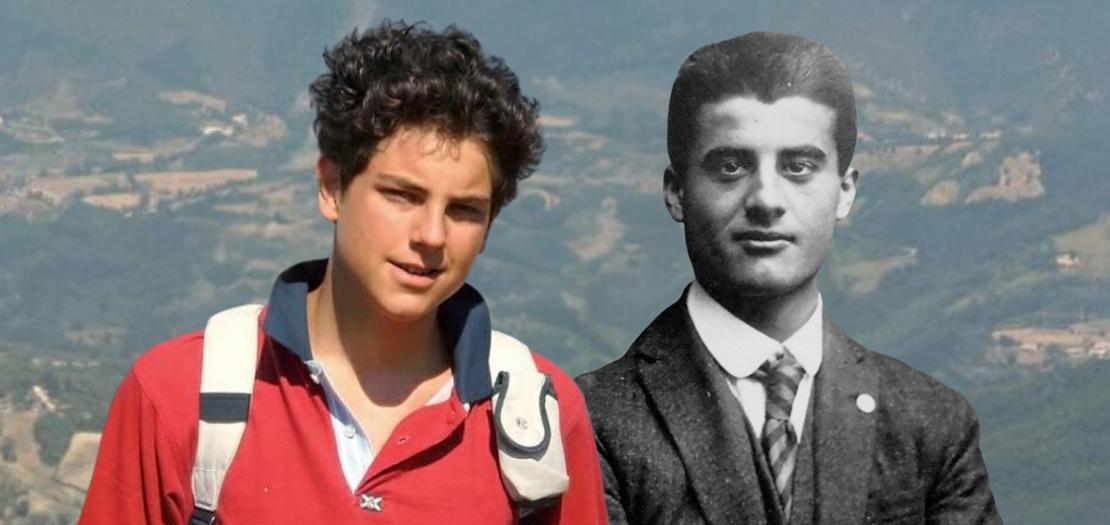Issued by the Catholic Center for Studies and Media - Jordan. Editor-in-chief Fr. Rif'at Bader - موقع أبونا abouna.org

Photo collage: (left) Blessed Carlo Acutis / (right) Blessed Pier Giorgio Frassati; file photos.
Pope Francis during his weekly general audience announced the canonization dates of two of the Catholic Church’s most popular young saints-in-the-making: the “techie teen” Carlo Acutis, and outdoorsman and activist Pier Giorgio Frassati.
“I want to say that next year, on the day of adolescents, I will canonize Blessed Carlo Acutis, and on the day of the youth next year, I will canonize Blessed Pier Giorgio Frassati,” the Pope said during his 20 November general audience address at St Peter’s Square in the Vatican.
Pope Francis will inaugurate the Jubilee of Hope on 24 December of this year, launching a special Holy Year that will last through all of 2025, and which he will close on 6 January 2026.
A special Jubilee for Adolescents will be held 25-27 April, during which Acutis will be formally canonized. Later next year, a special Jubilee for Young People will be observed from 28 July to 3 August, during which Frassati will be canonized, likely on Sunday, 3 August.
In a statement, the Archbishop Domenico Sorrentino of Assisi, where Acutis is buried, confirmed the news, saying that Acutis will be canonized during a special Mass celebrated by Pope Francis on 27 April 2025, in St. Peter’s Square.
Acutis, known to many as the “techie saint”, was born to Italian parents in London in 1991, and spent most of his life in Milan. His family visited Assisi for a stretch every year around Easter, as it was Acutis’s favorite place, and is where he asked to be buried.
He is most widely known for his expertise in computer technology, spending much of his spare time designing an online exhibition about Eucharistic miracles around the world, and which is still a point of reference for Catholics around the world.
Given his young age and knack for computers, Acutis has been presented as a role model for youth, a “saint of the ordinary” and also a possible patron saint for IT workers.
He died from an aggressive form of leukemia in 2006 at the age of 15, and his beatification process began in 2013.
In Christus Vivit (“Christ Lives”), Pope Francis’s exhortation about young people, he called Acutis a role model for contemporary young people who are frequently tempted by the illusions of “self-absorption, isolation and empty pleasure”.
“Carlo was well-aware that the whole apparatus of communications, advertising and social networking can be used to lull us, to make us addicted to consumerism and buying the latest thing on the market, obsessed with our free time, caught up in negativity,” the Pope said.
In February 2020, Pope Francis recognized the miraculous healing of a young boy in Brazil from a rare form of pancreatic cancer that was attributed to Acutis’s intercession, and in October that year the teen was beatified during a Mass at the Basilica of St. Francis in Assisi.
Acutis, who would be 33 if he were still alive, will be the Catholic Church’s first millennial to be canonized.
Over the summer, on 4 July, Archbishop Roberto Repole of Turin, where Frassati is from, inaugurated a special “Frassatian Year” of devotion in the lead up to the 100th anniversary of Frassati’s death on July 4, 1925.
Frassati, an Italian Catholic activist and a member of the Third Order of Saint Dominic, was born on 6 April 1901 in Turin into a wealthy, agnostic family.
Early on in his life, he was drawn to the Faith and to service of the poor, gaining a reputation for his intense and active prayer life, as well as his great love of the outdoors, especially hiking and mountain climbing.
Described by friends as “an explosion of joy”, Frassati attended a Jesuit school and joined various faith groups as an adolescent. He was also known as an avid sportsman and as a lover of the arts, including theatre, opera, museums and poetry.
He was deeply devoted to Catholic social teaching and service to the poor, and he translated this into social activism, eventually joining the People’s Party, based on the principles of Pope Leo XIII’s 1891 encyclical Rerum Novarum.
In addition to his political activism, Frassati was known to go out and serve the poor in the city slums, often giving away his bus fare money and then sprinting home to arrive for mealtime.
His political advocacy led him to oppose the communist as well as fascist causes in early 20th-century Italy, including one instance when he stood up to police for harassing a Church-sponsored protest in Rome, grabbing a fallen banner and using it to rally fellow students.
In 1922, Frassati joined the Lay Dominicans, but soon after, shortly before receiving his degree as a mining engineer, he contracted polio, which his doctors believed was due to his tending to the sick in the slums.
He died on 4 July 1925, at the age of 24, using some of his final moments to scribble a note asking a friend to take medicine to a poor man. In 1981, his remains were found to be incorrupt, meaning they had not decomposed, and his body was transferred from the family tomb to the Cathedral of St. John the Baptist in Turin.
At his beatification in 1990, St. John Paul II referred to Frassati as the “Man of the Eight Beatitudes”, adding: “I wanted to pay homage to a young man who was able to witness to Christ with singular effectiveness in this century of ours. When I was a young man, I, too, felt the beneficial influence of his example and, as a student, I was impressed by the force of his testimony.”







